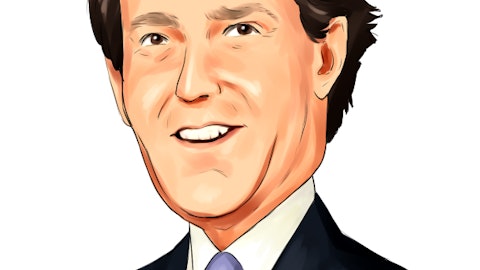How to Apply to Your Portfolio: Invest in businesses that generate per-share earnings growth over time. The better a management is at reinvesting its capital, the quicker earnings-per-share will grow over time.
Businesses that can grow reasonably quickly and have a high payout ratio –Philip Morris (PM) is an example – are able to generate high total returns for shareholders because they invest in only their best ideas and distribute the rest of money to shareholders.
On American Greatness & Growth

“American GDP per capita is now about $56,000. As I mentioned last year that – in real terms – is a staggering six times the amount in 1930, the year I was born, a leap far beyond the wildest dreams of my parents or their contemporaries. U.S. citizens are not intrinsically more intelligent today, nor do they work harder than did Americans in 1930. Rather, they work far more efficiently and thereby produce far more. This all-powerful trend is certain to continue: America’s economic magic remains alive and well.”
Buffett talked about the importance of having efficient management teams in his investments in an earlier quote in this article.
The word efficiency shows up again in this quote.
Innovation has led to efficiency gains in every industry since 1930. As a result, Americans are 6x better off on average than they were in 1930.
Americans on average are 3.8x better off than they were in 1947 (adjusted for inflation) as the image below shows.

Source: Multpl.com
Unfortunately America’s real GDP per capita growth is slowing…
“America’s population is growing about .8% per year (.5% from births minus deaths and .3% from net migration). Thus 2% of overall growth produces about 1.2% of per capita growth.
That may not sound impressive. But in a single generation of, say, 25 years, that rate of growth leads to a gain of 34.4% in real GDP per capita. (Compounding’s effects produce the excess over the percentage that would result by simply multiplying 25 x 1.2%.)
In turn, that 34.4% gain will produce a staggering $19,000 increase in real GDP per capita for the next generation. Were that to be distributed equally, the gain would be $76,000 annually for a family of four. Today’s politicians need not shed tears for tomorrow’s children.”
From 1947 through 2015 (a 68 year period) real GDP per capita increased to 3.8x what it used to be in the United States.
The next 68 year period will only see 2.3x gains. While it’s true the United States is still growing, the next generation cannot expect to realize the same growth that previous generations have.
Warren Buffett’s right – that’s nothing to shed a tear over, but it also shows there is much room for improvement.
“The good news, however, is that even members of the “losing” sides will almost certainly enjoy – as they should – far more goods and services in the future than they have in the past. The quality of their increased bounty will also dramatically improve. Nothing rivals the market system in producing what people want – nor, even more so, in delivering what people don’t yet know they want. My parents, when young, could not envision a television set, nor did I, in my 50s, think I needed a personal computer.”
The losing side Buffett is referring to is whoever gains less ground (the rich or the poor) as incomes continue to grow.
Free markets work because they allocate capital to its most efficient use. This does not happen instantly, but over long periods of time it is extremely effective at maximizing the value of society.
Free markets don’t slice the economic pie evenly, but they do greatly expand the pie so everyone society is better off in the long run.
“For 240 years it’s been a terrible mistake to bet against America, and now is no time to start. America’s golden goose of commerce and innovation will continue to lay more and larger eggs. America’s social security promises will be honored and perhaps made more generous. And, yes, America’s kids will live far better than their parents did.”
Warren Buffett again deviates from investing and discusses politics in this quote.
There is no doubt that American businesses and continued innovation will result in growth over time.
It isn’t clear what will happen with America’s socialized safety net. Nor is it clear that the next generation will truly live better than their parents did…
How can this be if GDP per capita is increasing? Because the next generation will have to contend with more debt than ever before.
The United States national debt sits at $19 trillion. That’s $59,000 of debt for every man, woman, and child in the United States.
Debt represents money that has already been spent by the government. Debt cannot increase indefinitely.
Government debt is the current generation borrowing from the future generation.
The next generation will simply not be able to borrow as much money as the previous has in order to give itself benefits in the present. Extreme debt levels are why it is far from guaranteed that the next generation will be as well off as the current generations.
We cannot pass the buck indefinitely. One generation will be stuck paying down debt instead of borrowing its way to more benefits. That is not political conjecture. It is economic certainty.
“Earlier, I told you how our partners at Kraft Heinz root out inefficiencies, thereby increasing output per hour of employment. That kind of improvement has been the secret sauce of America’s remarkable gains in living standards since the nation’s founding in 1776. Unfortunately, the label of “secret” is appropriate: Too few Americans fully grasp the linkage between productivity and prosperity.”
The way toward improvement in the United States is increasing efficiency(Buffett uses this word yet again! – it is important).
Increased automation and connectedness will make American workers far more efficient on a per capita basis than ever before – resulting in GDP growth.





